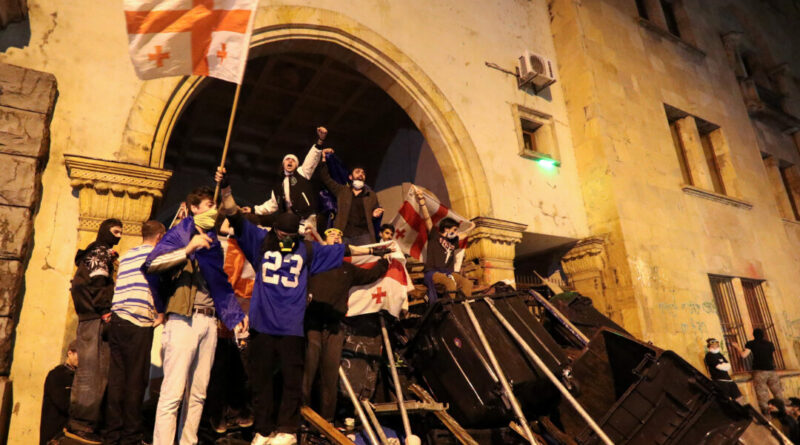After weeks of political debate, Georgia’s ‘Foreign Agents’ Bill is officially signed into law.
Russian defense minister accuses the EU and NATO of exploiting the issue to ‘fuel tensions’ in the small South Caucasus country.
After weeks of heated debate and street demonstrations, Georgia’s government has ratified legislation aimed at combatting perceived foreign influence.
“Today I formally approved the Transparency of Foreign Influence Law,” Georgian Parliament Speaker Shalva Papuashvili told reporters on June 3.
Proponents of the law say the legislation is necessary to protect the country from malign foreign influences operating under the guise of “civil society.”
“If nongovernmental organizations and mass media want to … influence the life of the Georgian people with funding from foreign governments, they must meet the minimum standard of transparency,” Mr. Papuashvili said.
“The public must know who is behind each actor,” he added.
Pushed through by the ruling Georgian Dream party, the law requires organizations that receive at least 20 percent of their funding from abroad to register as “organizations pursuing foreign interests.”
According to ruling party officials, the law is needed to safeguard Georgia’s sovereignty and combat “pseudo-liberal values” imposed by foreign—particularly Western—entities.
In March, Georgian Dream tabled a separate bill aimed at banning so-called “gender-reassignment” surgery and the adoption of children by same-sex couples.
Critics, meanwhile, say the “foreign agents” law will stifle free speech and expression and impede Georgia’s chances of joining the European Union, which granted the country candidate status last year.
The legislation’s domestic opponents include pro-EU opposition parties, local celebrities, and “civil society” groups.
They refer to the law as “the Russian law,” comparing it to legislation ostensibly used by Moscow to suppress political dissent.
The Kremlin, for its part, denies any association with the Georgian law or its recent ratification by parliament.
A former Soviet republic, Georgia gained independence from Moscow in 1991 following the dissolution of the Soviet Union.
The controversial legislation was first tabled by the ruling party in April.
Since then, it has passed three separate readings in parliament, which is largely controlled by Georgian Dream and its allies.

Each time, the bill’s opponents staged large demonstrations in Tbilisi, Georgia’s capital, which led to violent clashes with police and scores of arrests.
In late April, there was a counter-protest in support of the law, which reportedly drew tens of thousands but received little coverage in the Western media.
After parliament approved the bill’s final reading last month, Georgian President Salome Zourabichvili—whose post is largely symbolic—vetoed the legislation.
Days later, however, her veto was overridden by the law’s supporters in parliament.
Several Western countries and institutions—including the EU, the United States, Britain, France, and Germany—have called on Georgia to scrap the legislation.
In mid-May, the EU warned that the bill’s ratification could derail Georgia’s hope of eventually joining the 27-member bloc.
“Adoption of this law will negatively impact Georgia’s progress on the path towards EU membership,” Josep Borrell, the EU’s foreign policy chief, said.
Last week, U.S. Secretary of State Antony Blinken claimed that the law would “stifle the exercise of freedoms of association and expression” and impede the work of local media organizations.
He also announced the imposition of visa restrictions on Georgia and vowed to “review” the current status of U.S.–Georgia relations.
U.S. officials have also threatened to impose sanctions on Georgian lawmakers who voted in favor of the legislation.
Georgian Prime Minister Irakli Kobakhidze, a member of the ruling party, has said that Tbilisi would conduct its own assessment of Georgia’s relations with Washington.
“Georgian–U.S. relations must be comprehensively reviewed,” he told reporters on May 31.
Moscow, meanwhile, has decried the Western response to the law’s ratification, calling it “blatant interference in Georgia’s domestic affairs.”

Geopolitical Implications
Addressing the issue last week, Julianne Smith, Washington’s permanent envoy to NATO, said the popular protests against the law served to confirm the Georgian public’s “strong desire for Euro-Atlantic integration.”
“What’s been very clear is that the people of Georgia strongly desire to move towards Western institutions,” she said at a May 29 press briefing.
She also referred to a “deeply held belief” that Georgia “needs to become a member of the EU and … a member of the NATO alliance.”
“We have condemned the movement towards this foreign interference law and what the [Georgian] Dream party has moved towards in recent weeks,” Ms. Smith said.
“The U.S. position is pretty clear on this,” she added.
Andrey Belousov, Russia’s newly appointed defense minister, has accused both the EU and NATO of exploiting the issue to “fuel tensions” in Georgia.
“Some [EU and NATO] members have sought to strengthen their position in the South Caucasus region as a means of gaining access to Central Asia and its resources,” he told Russia’s TASS news agency on May 31.
The Associated Press contributed to this report.





